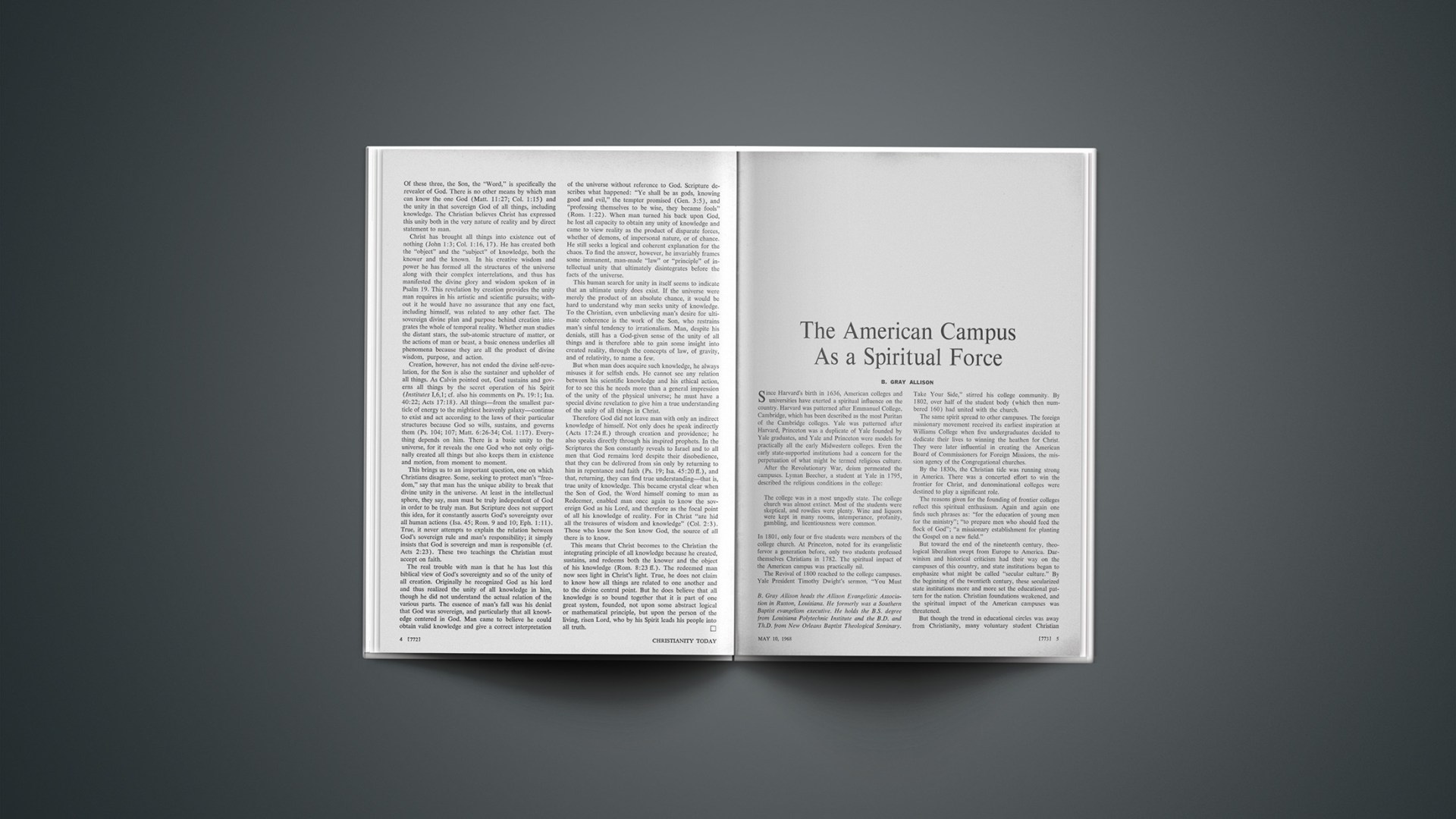Since Harvard’s birth in 1636, American colleges and universities have exerted a spiritual influence on the country. Harvard was patterned after Emmanuel College, Cambridge, which has been described as the most Puritan of the Cambridge colleges. Yale was patterned after Harvard, Princeton was a duplicate of Yale founded by Yale graduates, and Yale and Princeton were models for practically all the early Midwestern colleges. Even the early state-supported institutions had a concern for the perpetuation of what might be termed religious culture.
After the Revolutionary War, deism permeated the campuses. Lyman Beecher, a student at Yale in 1795, described the religious conditions in the college:
The college was in a most ungodly state. The college church was almost extinct. Most of the students were skeptical, and rowdies were plenty. Wine and liquors were kept in many rooms, intemperance, profanity, gambling, and licentiousness were common.
In 1801, only four or five students were members of the college church. At Princeton, noted for its evangelistic fervor a generation before, only two students professed themselves Christians in 1782. The spiritual impact of the American campus was practically nil.
The Revival of 1800 reached to the college campuses. Yale President Timothy Dwight’s sermon, “You Must Take Your Side,” stirred his college community. By 1802, over half of the student body (which then numbered 160) had united with the church.
The same spirit spread to other campuses. The foreign missionary movement received its earliest inspiration at Williams College when five undergraduates decided to dedicate their lives to winning the heathen for Christ. They were later influential in creating the American Board of Commissioners for Foreign Missions, the mission agency of the Congregational churches.
By the 1830s, the Christian title was running strong in America. There was a concerted effort to win the frontier for Christ, and denominational colleges were destined to play a significant role.
The reasons given for the founding of frontier colleges reflect this spiritual enthusiasm. Again and again one finds such phrases as: “for the education of young men for the ministry”; “to prepare men who should feed the flock of God”; “a missionary establishment for planting the Gospel on a new field.”
But toward the end of the nineteenth century, theological liberalism swept from Europe to America. Darwinism and historical criticism had their way on the campuses of this country, and state institutions began to emphasize what might be called “secular culture.” By the beginning of the twentieth century, these secularized state institutions more and more set the educational pattern for the nation. Christian foundations weakened, and the spiritual impact of the American campuses was threatened.
But though the trend in educational circles was away from Christianity, many voluntary student Christian movements sprang up. These included the YMCA, the YWCA, and, perhaps most significantly, the Student Volunteer Movement for Foreign Missions that originated at a student Christian conference under Dwight L. Moody.
Bible institutes and Bible colleges also began in the United States during this period. They have, of course, played a great part in the evangelical Christian movement.
As scientism flourished after World War I, the impact of Christianity on the campuses lessened. The longing for security came to the fore. The great depression rocked man, but his survival led him to commitment to a humanly directed universe. The post-World War II generation was an “uncertain” one, and the spiritual tone of the campuses registered this uncertainty.
The number of college students has risen meteorically—from 200,000 in 1900 to 4,000,000 in 1963; the estimate for 1970 is 10,000,000. In 1900, one in twenty-five high school graduates sought a college degree; today nearly one-third do.
With all this growth, there are many new problems for the Christian community on the modern university campus.
Students are confronted on campus by divergent convictions and codes that seem to have the same validity as their own. Many come to the university attempting to find answers to life but become disillusioned, concluding that they are getting more questions than answers. Many quit; some join hippie colonies; others become “loners” and seek the meaning of life elsewhere.
The university gives the appearance of being a close community of people who share the search for truth, a place of learning where everyone reads books and talks about worthwhile things. This appearance of unity is deceptive, however; the university is really a broken, fragmented community. Its members talk of ideas but their talk lacks a common language. Faculty members really are not in touch with one another. They see the part as the whole. No wonder the student, caught up daily in this fragmentation of truth, is bewildered.
Nathan M. Pusey, president of Harvard, tells what the student is seeking:
What every young person seeks in college from liberal education—whether or not he has articulated this—is self-discovery.… What such a person wants—what we all want—is a meaning that becomes a motivating force in our lives. And when we ask this question, whether we are conscious of it or not, we have begun to think religiously, and have begun to ask of God [“Religion’s Role in Liberal Education,” Religion and Freedom of Thought, 1954].
But students are not achieving this self-discovery they seek. In the last editorial of the Yale Daily News in 1962, a student speaks for himself:
Most of us graduate unsure of life’s calling. Yet Yale, which has determined the kind of life we seek, has imposed substantial barriers in the way of that life’s accomplishment. The university has demonstrated how the daily existence of most Americans can be criticized, even ridiculed, without prescribing the formula for a useful, rewarding life—and without showing how one can reconcile himself to a ridiculous world.
The spiritual force of the campus in recent days has been spent largely in revolt. Irving Kristol says it is, “above all, an existentialist revolt”: “the students are in rebellion, not so much because things are bad for them or for others, but because things are what they are for them and for others” (“What’s Bugging the Students,” The Atlantic, November, 1965).
There is an alarming increase of drug-taking on the campuses today. Jeremy Larner, writing in the Atlantic (Nov., 1965), quotes a student in an Eastern college who claimed he had not known of a college party anywhere in the past two years where at least one-third of the kids had not been “turned on.” The use of drugs indicates the seeking nature of the student, and also points to the failure of the church on the campus.
Larner says that one of the most common, popular, and easily induced drug delusions is the fantasy of rebirth. The great American dream, he writes, is to find an absolute truth. This is illustrated by the politician’s resort to the idea that the United States is to play a divinely ordained role in directing the progress of the world. Larner quotes D. H. Lawrence, who said of Americans: “Some [insist] on the plumbing, and some on saving the world; these being the two great American specialties.” The LSD missionaries attempt to do both at once—“to save the world by tinkering with the internal plumbing.” The idea is that happiness and fulfillment can be found through the “ingestion of a synthesized additive.”
If Larner’s description is true, it points to a tragic lack of spiritual power in the churches today. The Christian message to all men, on campus and off, is the message of both the necessity and the possibility of a new birth. It is the message of happiness and fulfillment found not through the ingestion of a synthesized additive but through the indwelling of a glorious Person. How can the Church have failed so miserably to give this message to the student of today?
The American campus was a positive spiritual force; it is a lesser spiritual force today; but its spiritual potential is staggering. The present student generation, perhaps more than any other, recognizes injustice, and wants to do something about it. It is encouraging that many students today recognize the problems of human relations, realize their personal lack for these needs, and are seeking an adequate source of solution. For this reason the potential of the American campus for a positive spiritual force is greater now than ever before. How can this potential be realized, both in church-related institutions and in those with no church ties?
About one-third of all degree-granting and two-year colleges in the United States are in some way related to a church body. These relationships vary greatly, and the colleges themselves vary greatly, also, both in philosophy and in quality. There is no real meeting of the minds among them as to their basic purposes and functions.
The church-related colleges do not have the spiritual impact they should in our day. Many have tried to pattern themselves after the larger secular universities, and, to quote Myron F. Wicke’s words, “have become pale imitations.… The result has been a bloated curriculum, an inefficiency in use of resources and personnel, and a confused educational goal” (The Church-Related College, 1964). Yet the Church has in its colleges the best place for dialogue between biblical theology and other academic disciplines. Church-related colleges should not have to do the evangelistic work of the churches; they should train committed young people to face the secular world.
In the early colleges there was a real sense of mission, of the Christian’s obligation to make Christ known. Revivals on college campuses were not unusual. The enthusiasm of the early colleges to share Christ with others must be recaptured—not through “revival meetings” as such, but through the recovery of an unashamed devotion to Christ and an aggressive witness for him.
It seems to me, also, that church-related colleges must become unapologetically Christian. They must take a firm stand on the Word of God. Unfortunately, church-related colleges house many of those students who go to college to discover answers to life’s problems but find they get more questions than answers.
Church-related colleges have not had the spiritual impact they could and should have because many of them are lacking in academic quality. They need faculty members of outstanding ability, firm Christian conviction, and warm hearts who can attract exciting students and have an influence on their lives.
But most of our five to six million college students are in non-church-related schools. What kind of training are they getting? In the secular universities we have the greatest opportunity ever to make a genuine spiritual impact on the world. Most students feel that Christianity is irrelevant, a relic of the past, and that the Church is behind the times. One professor suggested that his history students become acquainted with a local Inter-Varsity group because its members were the only persons he knew who indulged in the medieval practice of an all-pervading God-consciousness. The Church must show the relevance of the Gospel to the student’s present and future way of life.
I am convinced that the secular university can best be penetrated by faculty members and students in various academic disciplines who are genuinely Christian, who are faithful in their university tasks, and who have an understanding of the current movements among college students. The person who is lax or slipshod in his own work has very little witness to the person who does his work well.
One area of concern is that Christian professors are often reluctant to teach from their religious perspective, even though it seems imperative that they do so. Their colleagues who believe in scientific humanism, for example, are certainly not bashful about teaching from their perspective. I believe the university student should hear the Christian view as a live option. The failure of the Christian professor to present it seems to say to the student that though Christianity may have some value in practical life, it is really irrelevant to intellectual life.
However, it is not enough for the Christian professor to teach from his Christian perspective; he also must have a personal relationship with his students. The friendship of a Christian professor who excels in his field with a brilliant young student who does not know Christ could have an earth-shaking effect.
The local churches also must be involved. In this day of travel, more and more students commute. There is hardly a church that does not have at least one member enrolled in a college. Pastors must prepare to minister to these students, and to help train them for service to Christ. They must take the university more seriously and try to understand and love it. They must keep up with the theological and social issues of the day and must speak to them.
Something must happen on the campus before anything will happen through the campus. I believe with all my heart that the American campus holds the greatest potential for positive spiritual force in the world, and I also believe that today that force can be released. Here on the campuses of America are tomorrow’s leaders in government, industry, science, medicine, and home life. Here are tomorrow’s university professors. Here also are many thousands of foreign students who, almost without exception, are the cream of the crop in their homeland. Here are the leaders for the nations of the world. What a tremendous impact for Christ across the world if they could be won!
Here on our campuses are the missionaries, the evangelists who can evangelize the world. They must be led to acknowledge the Lordship of Christ in their lives, and then, wherever they go in their varied vocations, they will be evangelists. The campus must be reached with the Gospel, inspired by the challenge, motivated to service, if its great potential is to be realized.
In the past the American campus has seen times of the waxing and waning of spiritual force. Today the positive spiritual force of the campus is not being exerted. But I believe we stand near the beginning of a change, the coming of a new day. A group of Prostestant monks in France has this motto: “Do not be afraid to precede the dawn.” Let the Church claim that phrase for itself.
Milton D. Hunnex is professor and head of the department of philosophy at Willamette University, Salem, Oregon. He received the B.A. and M.A. degrees from the University of Redlands and the Ph.D. in the Inter-collegiate Program in Graduate Studies, Claremont, California. He is author of “Philosophies and Philosophers.”










